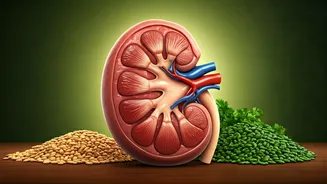Unlock Your Career Potential with Lifestyle Choices! Explore 7 impactful changes for professional growth. Prioritize self-care strategies for success
In today's competitive world, climbing the career ladder
requires more than just technical skills and a good education. Your lifestyle choices play a significant role in shaping your professional trajectory.

It's about creating a holistic approach that fuels your productivity, boosts your creativity, and helps you stay focused on your goals. Here are seven lifestyle changes that can make a real difference in your career journey:
Prioritize Sleep: The Foundation of Success
Many Indians downplay the importance of sleep, often sacrificing it for work or social commitments. However, adequate sleep is crucial for cognitive function, memory consolidation, and overall well-being. Think of it as charging your phone – without a full battery, performance suffers.

Aim for 7-8 hours of quality sleep each night. Establish a regular sleep schedule, even on weekends, to regulate your body's natural sleep-wake cycle. Create a relaxing bedtime routine that might include reading, meditation, or a warm bath.
Avoid screens (phones, tablets, TVs) at least an hour before bed, as the blue light emitted can interfere with melatonin production, a hormone that regulates sleep. A well-rested mind is a sharp mind, ready to tackle challenges and make informed decisions.
So, make sleep a non-negotiable part of your routine. You will see the difference by yourself.
Embrace Regular Exercise: Energize Your Body and Mind
Sitting at a desk for long hours can take a toll on your physical and mental health. Regular exercise is a powerful antidote. It boosts energy levels, reduces stress, improves focus, and enhances creativity. You don't need to become a marathon runner or spend hours at the gym.

Find an activity you enjoy, whether it's brisk walking, yoga, swimming, cycling, or dancing. Aim for at least 30 minutes of moderate-intensity exercise most days of the week.
Even short bursts of activity, like taking the stairs instead of the elevator or going for a walk during your lunch break, can make a difference. Exercise releases endorphins, which have mood-boosting effects. It also improves blood flow to the brain, enhancing cognitive function.
Consider joining a sports team or fitness class for added motivation and social interaction. Keep track of your exercise goals or not so that it can be achieved.
Nourish Your Body with Healthy Food: Fuel Your Performance
What you eat directly impacts your energy levels, focus, and overall health. A diet rich in fruits, vegetables, whole grains, and lean protein provides the fuel your body and brain need to perform at their best.
Avoid processed foods, sugary drinks, and excessive caffeine, which can lead to energy crashes and decreased productivity. Choose healthy snacks like nuts, seeds, or yogurt to keep your energy levels stable throughout the day. Plan your meals in advance to avoid impulsive, unhealthy choices.
Hydration is also crucial. Drink plenty of water throughout the day to stay alert and focused. Consider consulting a nutritionist or registered dietitian for personalized dietary advice. Remember, food is fuel, and the better the fuel, the better the performance.
This is the most important thing to do as it directly gives energy to perform tasks at work.
Practice Mindfulness and Meditation: Reduce Stress and Enhance Focus
Stress is a common companion in the workplace, but chronic stress can negatively impact your health and career. Mindfulness and meditation are powerful tools for managing stress, improving focus, and enhancing emotional intelligence.

Even a few minutes of daily meditation can make a significant difference. Find a quiet space, close your eyes, and focus on your breath. When your mind wanders, gently redirect your attention back to your breath.
There are numerous guided meditation apps and online resources available to help you get started. Mindfulness can also be practiced throughout the day. Pay attention to the present moment, whether you're eating, walking, or working.
By being fully present, you can reduce stress and improve your ability to focus on the task at hand. Mindfulness is not just about relaxation; it's about cultivating awareness.
Cultivate a Growth Mindset: Embrace Challenges and Learn Continuously
A growth mindset is the belief that your abilities and intelligence can be developed through dedication and hard work. This is crucial for career growth, as it allows you to embrace challenges, learn from mistakes, and continuously improve.
Instead of viewing failures as setbacks, see them as opportunities for growth. Seek out new learning experiences, whether it's taking online courses, attending workshops, or reading books. Be open to feedback and use it to improve your performance.
Surround yourself with people who inspire and challenge you. A growth mindset is not about being perfect; it's about striving to be better. Embrace the journey of continuous learning and development, and you'll be well-equipped to navigate the ever-changing landscape of your career.
Build Strong Relationships: Network and Collaborate
Career success is rarely a solo journey. Building strong relationships with colleagues, mentors, and industry professionals is essential. Networking can open doors to new opportunities, provide valuable insights, and offer support during challenging times.
Attend industry events, join professional organizations, and connect with people online. Be proactive in reaching out to others and building genuine relationships. Collaboration is also key. Working effectively with others can lead to innovative solutions and enhanced productivity.
Be a team player, share your ideas, and be open to feedback. Remember, relationships are built on trust and mutual respect. Invest in building strong connections, and you'll find that your career journey becomes more rewarding and fulfilling.
Develop Time Management and Organization Skills: Maximize Productivity
Effective time management and organization skills are crucial for maximizing productivity and reducing stress. Learn to prioritize tasks, set realistic goals, and avoid procrastination. Use tools like calendars, to-do lists, and project management software to stay organized.
Break down large tasks into smaller, more manageable steps. Avoid multitasking, as it can decrease focus and productivity. Instead, focus on one task at a time and give it your full attention. Learn to delegate tasks when possible. Regularly review your progress and adjust your plans as needed.
Time is a valuable resource. By managing it effectively, you can accomplish more, reduce stress, and achieve your career goals.
AI Generated Content. Glance/InMobi shall have no liability for the content











